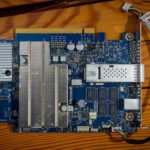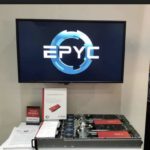At the Microsoft Build conference held this week, Microsoft announced Azure Machine Learning Hardware Accelerated Models powered by Project Brainwave integrated with the Microsoft Azure Machine Learning SDK. In this configuration, customers gain access to industry-leading artificial intelligence inferencing performance for their models using Azure’s large-scale deployments of Intel FPGA (field programmable gate array) technology. “With today’s announcement, customers can now utilize Intel’s FPGA and Intel Xeon technologies to use Microsoft’s stream of AI breakthroughs on both the cloud and the edge.”
Radio Free HPC Looks at New USA Supercomputing Map
In this podcast, the Radio Free HPC team looks at the new interactive USA Supercomputing Map from Hyperion Research. “As part of the discussion, Rich recaps Hyperion’s recent HPC User Forum in Tucson. The event featured an extended session on Quantum Computing with presentations by D-Wave Systems, Google, IBM, Intel, Microsoft, NIST, and Rigetti Computing.”
Universities step up to Cloud Bursting
In this special guest feature, Mahesh Pancholi from OCF writes that many of universities are now engaging in cloud bursting and are regularly taking advantage of public cloud infrastructures that are widely available from large companies like Amazon, Google and Microsoft. “By bursting into the public cloud, the university can offer the latest and greatest technologies as part of its Research Computing Service for all its researchers.”
Altair Steps up to Azure Cloud with Inspire Unlimited
Altair software is now part of the Inspire Unlimited software-as-a-service offering available on the Azure cloud. “Unlike the HyperWorks Unlimited Appliance, where performance is based on the number of nodes, Inspire’s scale requirements are based on the number of simultaneous users; there could be 1,000 engineers working together at a time,” says Sam Mahalingam from Altair. “We felt that the HPC environment in Azure was architected to meet the type of back-end requirements we needed for Inspire.” Altair uses Microsoft Azure Virtual Machines, with NV instances powered by NVIDIA Tesla M60 GPUs.
Alces Flight: On Demand HPC now Available in the Azure Marketplace
Microsoft Azure customers worldwide now gain access to Alces Flight to take advantage of the scalability, reliability and agility of Azure. With Alces Flight, it is possible for researchers to spin up any size of High-Performance Computing cluster in minutes, providing users with a fully-featured HPC environment that includes thousands of open source applications.
Big 3 Cloud Providers join with NSF to Support Data Science
“NSF’s participation with major cloud providers is an innovative approach to combining resources to better support data science research,” said Jim Kurose, assistant director of NSF for Computer and Information Science and Engineering (CISE). “This type of collaboration enables fundamental research and spurs technology development and economic growth in areas of mutual interest to the participants, driving innovation for the long-term benefit of our nation.”
Microsoft to acquire Avere Systems
Over at the Microsoft Blog, Jason Zander writes that the company is acquiring Avere Systems. “By bringing together Avere’s storage expertise with the power of Microsoft’s cloud, customers will benefit from industry-leading innovations that enable the largest, most complex high-performance workloads to run in Microsoft Azure. We are excited to welcome Avere to Microsoft, and look forward to the impact their technology and the team will have on Azure and the customer experience.”
Radio Free HPC does their 2018 Technology Predictions
In this podcast, the Radio Free HPC team reviews their 2017 technology predictions from last year. After that, we do our 2018 Predictions including a bombshell on who Rich thinks will acquire Cray by the end of the year.
Microsoft Azure Becomes First Global Cloud Provider to Deploy AMD EPYC
Today AMD announced the first public cloud instances powered by the AMD EPYC processor. Microsoft Azure has deployed AMD EPYC processors in its datacenters in advance of preview for its latest L-Series of Virtual Machines (VM) for storage optimized workloads. The Lv2 VM family will take advantage of the high-core count and connectivity support of […]
Cray Supercomputing Comes to Microsoft Azure
Today Cray announced a partnership with Microsoft to offer dedicated Cray supercomputing systems in Microsoft Azure. Under the partnership agreement, Microsoft and Cray will jointly engage with customers to offer dedicated Cray supercomputing systems in Microsoft Azure datacenters to enable customers to run AI, advanced analytics, and modeling and simulation workloads at unprecedented scale, seamlessly connected to the Azure cloud.












